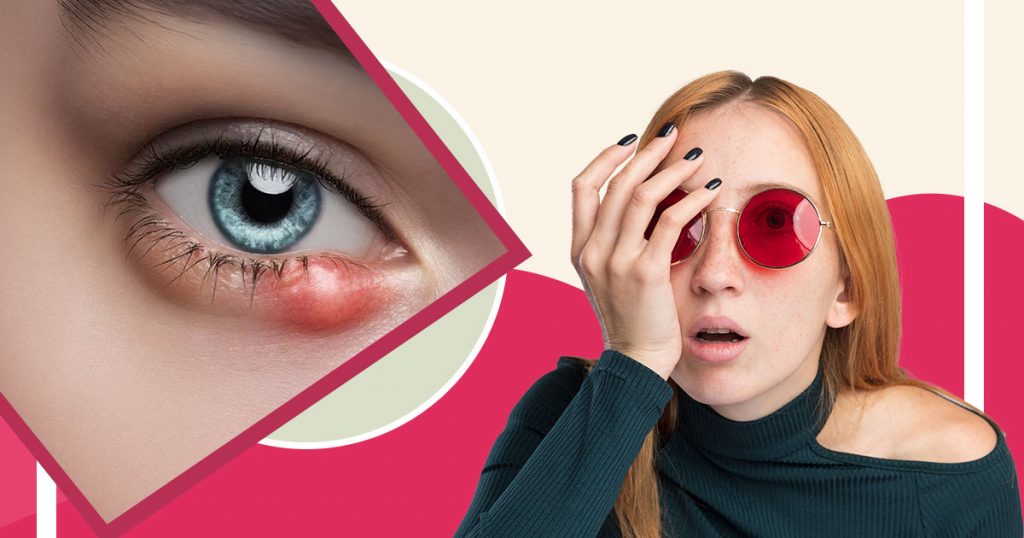Allergies can do more than just make your eyes itchy and watery—they can also lead to irritation that affects your eyelids. When allergens like pollen get into your eyes, they can cause inflammation, making it easier for oil glands along the eyelid to get blocked. This blockage creates the perfect conditions for a red, painful bump to form. While bacteria are the main cause, allergy-related eye irritation can increase the chances of dealing with one.
What is a Stye?
A stye is a red, swollen bump that forms on the edge of the eyelid when an oil gland gets clogged and infected. It usually appears near the base of the eyelashes or inside the eyelid and can be painful or tender to the touch.
While bacteria are the most common cause, irritation from allergies can make the eyelids more prone to blockages. Rubbing your eyes when they’re itchy or inflamed can trap debris and bacteria in the glands, increasing the risk of developing one. Exposure to pollen and other allergens can contribute to the irritation that leads to this condition.
Symptoms of a Stye
A stye often starts as minor discomfort before turning into a noticeable bump. Common symptoms include:
- Red, swollen eyelid
- A painful lump near the eyelashes
- Tenderness or soreness in the affected area
- Increased tearing
- A gritty feeling in the eye
- Light sensitivity
Can Allergies Cause a Stye?
Allergies can make the eyes irritated, swollen, and watery, leading to frequent rubbing or touching of the eyelids. This irritation increases the chances of clogging oil glands, creating the right conditions for a stye to form. Pollen and other allergens can also trigger inflammation around the eyes, making them more sensitive and prone to blockages.
While bacteria are the main cause, allergies can make the eyelids more vulnerable. Constant itching and rubbing introduce more dirt and bacteria, increasing the likelihood of developing an infection. If styes keep appearing during allergy season, allergens may be a contributing factor.
How to Prevent Styes from Developing
Keeping your eyelids clean and avoiding eye irritation can lower the risk of developing a stye. Simple habits can help reduce the chances of blocked oil glands and bacterial infections.
Wash Your Hands and Face Regularly
Touching your eyes with unwashed hands can transfer bacteria and allergens, increasing irritation and infection risk. Washing your face daily helps remove allergens like pollen that may contribute to eye inflammation.
Avoid Rubbing Your Eyes
Rubbing itchy eyes can trap bacteria in the eyelid’s oil glands, leading to blockages. If allergies cause discomfort, using a cold compress or allergy-friendly eye drops can help soothe irritation without spreading bacteria.
Keep Contact Lenses and Makeup Clean
Wearing unclean contact lenses or using old eye makeup can introduce bacteria to the eyelids. Always disinfect lenses properly, replace eye makeup regularly, and avoid sharing cosmetics to prevent infections.
Use Allergy Medication When Needed
Managing allergies can help reduce eye irritation that leads to frequent rubbing. Antihistamines, allergy eye drops, or avoiding known triggers like pollen can help keep the eyes calm and lower the risk of developing a stye.
Maintain Good Eyelid Hygiene
Gently cleaning the eyelids with a warm washcloth or a mild cleanser can prevent oil buildup and blockages. Regular eyelid care is especially helpful for those prone to allergies or frequent eye irritation.
Final Thoughts on Allergies and Styes
Keeping allergies under control can make a big difference in preventing eye irritation that leads to styes. Reducing exposure to allergens, practicing good hygiene, and avoiding excessive eye rubbing can help protect your eyelids. If styes keep coming back during allergy season, managing symptoms early can lower the chances of dealing with painful bumps. Simple changes in daily habits can go a long way in keeping your eyes healthy and irritation-free.
